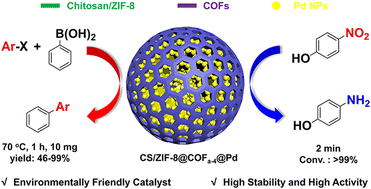Preparation of macroscopic objects using covalent organic frameworks (COFs) is challenging. However, it is imperative to fully utilize their customizable pore structure to synthesize nanomaterials with controlled size and dispersion. Here, CS/ZIF-8@COF microcapsules were successfully synthesized by growing COFs in situ within the pore channels of honeycomb chitosan microcapsules. COFs of different structures could grow uniformly and form fibrous or vesicle-like structures on the inner walls of chitosan microcapsules. COFs can significantly prevent chitosan from swelling in water and enhance the stability of CS/ZIF-8 microcapsules. The inherent porosity of COFs facilitates the immobilization and dispersion of palladium nanoparticles, and a large number of N atoms in their structure effectively prevent the aggregation and shedding of palladium. The prepared CS/ZIF-8@COFa-4@Pd showed excellent catalytic activity in the reduction of p-NP (Kapp = 1.1 min−1) and the Suzuki coupling (TOF = 7.1 × 104) reaction. The CS/ZIF-8@COFa-4@Pd catalyst exhibited no obvious loss of catalytic activity after five repeated uses.

